Kaist
Korean

Announcements
College of Engineering Notice
-
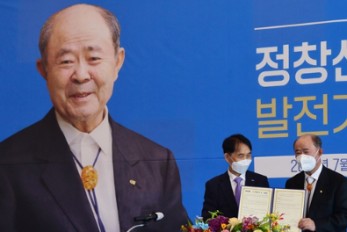
Jungheung to Donate 30B KRW for Semiconductor Research and E..
< President Lee poses (left) with Jungheung Chairman Jung during a donation ceremony on July 19 at Daejeon campus. > Jungheung Group, a construction company in Korea, made a pledge to donate 30 billion KRW for semiconductor research and education at KAIST. Junghueng will spend 20 billion KRW to construct the semiconductor education and research facilities that will be established in Pyeongtaek City in collaboration with Samsung Electronics, and 10 billion will go for supporting the educational training program. The pledge ceremony was held at the Daejeon campus with Jungheung Group Chairman Chang-Sun Jung, KAIST President Kwang Hyung Lee, and Pyeongtaek City Mayor Jang-Seon Jung in attendance. Chairman said, “The only way to earn a competitive edge in this era of technology hegemony is to invest in young talents in the science and technology fields. They will grow up to be excellent experts who will feed tens of thousands of people.” He added, “Donating to nurture future talents is the most rewarding investment we can make for the future.” President Lee said, “Jungheung’s donation is an investment in the semiconductor industry in Korea, which will be the growth engine for the nation. We will make every effort to foster the world’s best workforce in the semiconductor sector.” Mayor Jung also expressed high hopes for the advancement of KAIST into ‘Brain City,’ a complex designated with Samsung Electronics for the semiconductor industry. “The city government will fully support the semiconductor industry and KAIST. In doing so, we look forward to becoming the center of the semiconductor industry in the nation,” announced Mayor Jung.
-
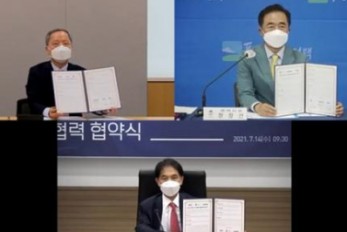
KAIST-Pyeongtaek City-Samsung Join Hands to Foster Seasoned ..
< Samsung Electronics President Park, Pyeongtaek City Mayor Jung, and KAIST President Lee (clockwise) > KAIST President Kwang Hyung Lee agreed to establish the ‘Department of Samsung Semiconductors’ in collaboration with Samsung Electronics Co Ltd and the City of Pyeongtaek in Kyonggi-do. The three parties, including Pyeongtaek City Mayor Jang-Seon Jung and President of Samsung Electronics Hark-Kyu Park, signed the MOU on July 13 during an online ceremony. President Lee said that the collaboration will help spur Korea’ semiconductor industry forward. “We will spare no effort to foster seasoned semiconductor personnel who will carve out our competitive edge in the global market,” he explained. While Samsung will sponsor the Department of Semiconductors on the Daejeon campus, Pyeongtaek City will provide 460,000 m2 of land for establishing the KAIST Semiconductor R&D Center. Samsung Electronics has run two massive semiconductor complexes in the city. The triangle of collaboration is expected to bring about synergy by generating field-based education and R&D. KAIST also announced plans to work closely with the local government of Pyeongtaek City to create startup towns and quality jobs in the region by providing software education and technology as well as cultural spaces for local citizens. Vice Minister of the Ministry of Science and ICT Hong-Taek Yong and National Assemblymen Jaeill Byun and Eui-dong Yu, who represent the ruling and opposition parties on the Semiconductor Special Committee, joined the online ceremony and praised the collaboration.
-
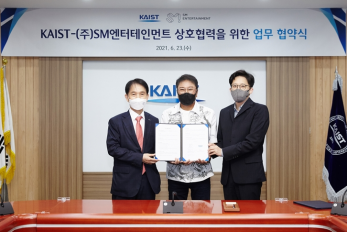
KAIST-SM Entertainment Joint Research for Metaverse
“Culture scientist will play a role in the future of the entertainment industry” < KAIST President Kwang Hyung Lee and SM Entertainment Founder and Chief Executive Producer Soo-Man Lee signed an MOU on joint research of the metaverse. > KAIST President Kwang Hyung Lee and SM Entertainment Founder and Chief Executive Producer Soo-Man Lee signed an MOU on joint research of the metaverse on June 23 at the Daejeon campus. SM Entertainment is the powerhouse of K-pop and Lee is a pioneering figure who helped Korean pop culture emerge into a global phenomenon. The KAIST-SM metaverse partnership will bring out new culture technology that will lead the virtual entertainment industry by creating more dynamic and vivid digital technologies. KAIST will utilize its AI, robot, and network technologies, while SM will provide its content production expertise for this metaverse research. President Lee said, “SM artists have mesmerized global audiences and opened new markets for K-Pop. Combining the creativity and cultural imagination of SM with technologies from KAIST, together we will make significant contributions to the advancement of virtual reality as well as the global entertainment industry.” The Graduate School of Culture Technology has been engaging in a variety of creative projects incorporating science and technology for decades and will now actively participate in this metaverse project with SM. < SM Entertainment Founder and Chief Executive Producer Soo-Man Lee stressed that producers in the future will be culture scientists during a special lecture for the KAIST community via Zoom. > CEP Lee explained, “The power of celebrities and avatars will rule the future entertainment industry. SM will make a leap forward to be a ‘first mover’ in the digital entertainment industry with this partnership with KAIST. This partnership will shape the new digital future of the entertainment industry boosted by cutting-edge technologies.” CEP Lee also delivered a special lecture for the KAIST community via Zoom. Saying that producers in the future will be ‘culture scientists’, he stressed the importance of technology converging with culture. “The key factor for K-pop’s success lies in the impressive technology of Korea. SM places a high priority on developing cultural technology and creating new artists and products combining this technology,” added Lee, citing the hologram contents of Beyond Live concerts and the new 4+4 girl group composed of four girls and four avatars called ‘Aespa.’
-
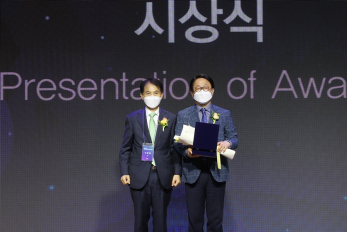
Research Day Highlights the Most Impactful Technologies of t..
Technology Converting Full HD Image to 4-Times Higher UHD Via Deep Learning Cited as the Research of the Year < Professor Munchurl Kim, the awardee of the Research of the Year gives a lecture on > The technology converting a full HD image into a four-times higher UHD image in real time via AI deep learning was recognized as the Research of the Year. Professor Munchurl Kim from the School of Electrical Engineering who developed the technology won the Research of the Year Grand Prize during the 2021 KAIST Research Day ceremony on May 25. Professor Kim was lauded for conducting creative research on machine learning and deep learning-based image processing. KAIST’s Research Day recognizes the most notable research outcomes of the year, while creating opportunities for researchers to immerse themselves into interdisciplinary research projects with their peers. The ceremony was broadcast online due to Covid-19 and announced the Ten R&D Achievements of the Year that are expected to make a significant impact. To celebrate the award, Professor Kim gave a lecture on “Computational Imaging through Deep Learning for the Acquisition of High-Quality Images.” Focusing on the fact that advancements in artificial intelligence technology can show superior performance when used to convert low-quality videos to higher quality, he introduced some of the AI technologies that are currently being applied in the field of image restoration and quality improvement. Professors Eui-Cheol Shin from the Graduate School of Medical Science and Engineering and In-Cheol Park from the School of Electrical Engineering each received Research Awards, and Professor Junyong Noh from the Graduate School of Culture Technology was selected for the Innovation Award. Professors Dong Ki Yoon from the Department of Chemistry and Hyungki Kim from the Department of Mechanical Engineering were awarded the Interdisciplinary Award as a team for their joint research. Meanwhile, out of KAIST’s ten most notable R&D achievements, those from the field of natural and biological sciences included research on rare earth element-platinum nanoparticle catalysts by Professor Ryong Ryoo from the Department of Chemistry, real-time observations of the locational changes in all of the atoms in a molecule by Professor Hyotcherl Ihee from the Department of Chemistry, and an investigation on memory retention mechanisms after synapse removal from an astrocyte by Professor Won-Suk Chung from the Department of Biological Sciences. Awardees from the engineering field were a wearable robot for paraplegics with the world’s best functionality and walking speed by Professor Kyoungchul Kong from the Department of Mechanical Engineering, fair machine learning by Professor Changho Suh from the School of Electrical Engineering, and a generative adversarial networks processing unit (GANPU), an AI semiconductor that can learn from even mobiles by processing multiple and deep networks by Professor Hoi-Jun Yoo from the School of Electrical Engineering. Others selected as part of the ten research studies were the development of epigenetic reprogramming technology in tumour by Professor Pilnam Kim from the Department of Bio and Brain Engineering, the development of an original technology for reverse cell aging by Professor Kwang-Hyun Cho from the Department of Bio and Brain Engineering, a heterogeneous metal element catalyst for atmospheric purification by Professor Hyunjoo Lee from the Department of Chemical and Biomolecular Engineering, and the Mobile Clinic Module (MCM): a negative pressure ward for epidemic hospitals by Professor Taek-jin Nam (reported at the Wall Street Journal) from the Department of Industrial Design.
-
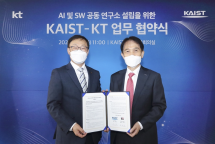
KAIST-KT AI & SW Research Center to Open
< President Kwang Hyung Lee (right) and KT CEO Hyeon-Mo Ku signed the agreement to launch the AI and SW Research Center. > KAIST and KT will team up to advance AI technology by co-founding the “AI and SW Research Center.” Last month, President Kwang Hyung Lee and KT CEO Hyeon-Mo Ku signed the agreement to launch the center in Daejeon by the end of the year. The KAIST-KT AI and SW Research Center will focus on exploring original technologies and industry AI that will incorporate KAIST’s excellent R&D capabilities and KT’s future AI-based business portfolio. The center will be located at the KT’s Research Center in Daejeon. The two sides selected 15 futuristic projects for developing original technologies in the fields of sound, vision, health, and humanistic AI. In addition, the center plans to develop an AI model that can perceive and reply to precise and complex information-based situations through human conversation and detection, sound, images, and sensing. To lay the groundwork for next-generation markets, the center will work on five industrial AI projects in the fields of media, bio, and health. Both KAIST and KT aim to lead digital innovation and changes in lifestyles by developing a next-generation AI model to follow GPT-3 (Generative Pre-Training 3) and strengthen the global competitiveness of AI technologies. Furthermore, KT will provide infrastructure including space, equipment, and manpower to KAIST students hoping to form a start-up. A KT accelerator for start-up cultivation and investment will also help KAIST students via a start-up mentoring program. It will also run scholarship and internship programs for students who stand out during joint research projects. President Lee said, “KT is an excellent AI R&D partner dealing with differentiated data from diverse sectors. Through the AI core technology lab, I look forward to seeing innovative technologies that will be meaningful not only for academia, but also for industry.”
-
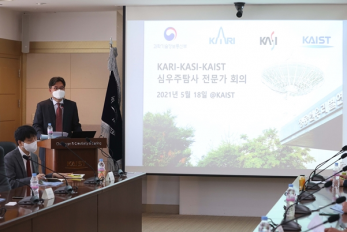
KAIST to join Deep Space Exploration Project
< A meeting to discuss medium- and long-term deep space exploration plans and collaborations among KAIST, KARI, and KASI were held recently at KAIST campus. > KAIST agreed to launch the Deep Space Exploration Research Consortium with two key leading aerospace research institutes, the Korea Aerospace Research Institute (KARI) and the Korea Astronomy and Space Science Institute (KASI) during a recent meeting at the KAIST campus. President Kwang Hyung Lee, KARI President Sang-Yool Lee, KASI President Young-Deuk Park, and Vice Minister of Science and ICT Hong-taek Yong attended the meeting to discuss medium- and long-term deep space exploration plans and collaborations. The three entities have cooperated in scientific research for the last 30 years during which Korea has been developing its space exploration expertise. They signed the MoU for Cooperation for R&D and Industrialization on Deep Space Exploration’ last December. The research consortium will share and discuss research plans for space science research and exploration technology, and contribute to planning the nation’s deep space exploration. At the meeting, KAIST reported its plans to return KITSAT-1 to Earth, Korea’s first satellite using local technology, and to explore the radiation belt (the Van Allen belt) around Earth. KAIST launched Korea’s first satellite KITSAT-1 in 1992. Meanwhile, KARI shared their plans to launch a lunar landing module using a Korean Space Launch Vehicle by 2030 and explained the current technologies and research related to a lunar landing and space exploration. Based on the payload technology it has been building on for the last 20 years, KASI emphasized the importance of research for deep space exploration in relation to the formation of the universe and the origin of mankind. Vice Minister of Science and Technology Yong also stressed that “to enhance Korea’s capabilities for space research after launching our space launch vehicle, Nuri, in October, there must be continued efforts and preparation for higher level space research, including space exploration planning. The various experts’ opinions discussed in today’s meeting will be taken into consideration for governmental policies related to the ‘National Space Exploration Roadmap’ to be established in the latter half of this year.”
-
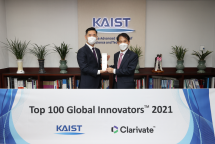
KAIST Listed as Top 100 Global Innovator by Clarivate
< President Lee (right) poses with Clarivate Korea´s Ahn (left) after receiving the Top Global Innovators trophy on May 12. > KAIST was named as one of the Top 100 Global Innovators 2021 by Clarivate. Among the top 100, 42 US corporations, including Amazon, Apple, Google, and Facebook, and 29 Japanese corporations made the list. The list included four Korean corporations Samsung Electronics, LG Electronics, LS Electronics, and SK Telecommunications. KAIST, the only university listed as a global innovator, regained its place in the Top 100 Global Innovators this year after last being named in 2013. Industrywide, the electronics and semiconductor sectors took the majority of the top global innovators spots with 21 and 12 corporations respectively. President Kwang Hyung Lee received the trophy from Clarivate Korea Regional Director Seongsik Ahn on May 12 at KAIST’s main campus. President Lee said, “We are glad that our continued innovation efforts are receiving worldwide recognition and will continue to strive for sustainable growth as a university that creates global value and impact.” Every year since 2012, the Top 100 Global Innovators has identified companies and institutions at the pinnacle of the global innovation landscape by measuring the ideation culture that produces patents and puts them at the forefront. Clarivate tracks innovation based on four factors: 1. volume of patents 2. influence 3. Success and 4. globalization using patents, patents indices, and citation index solutions. For measuring the patent volume, the Top 100 candidate must meet a threshold of 100 granted patents received in the past five years and more than 500 in the Derwent World Patents Index over any time period. Clarivate assesses the level of influence of the patented ideas by reviewing the number of external citations their inventions received over the past five years. For measuring success, they look at how successful each candidate has been getting their applications for patent protection approved by patent offices around the world over past five years. Globalization measures the investment levels of each candidate in their patent applications, a metric designed to assess both the importance of invention to the companies as well as the footprint of commercialization. (END)
-
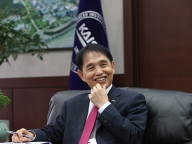
The Educational ‘Metaverse’ Is Coming
< KAIST President Kwang Hyung Lee > The universities best equipped with digital infrastructure and savvy human resources will emerge as the new leaders − no matter where they are, says Kwang Hyung Lee It goes without saying that the Covid-19 pandemic has taken a heavy toll on the education sector. Approximately 1.6 billion students from 192 countries, or 91 per cent of the world’s student population, have experienced educational disruptions. As we all know, this disruption led to online education hastily emerging as an important new platform. However, approximately 29 percent of young people worldwide, about 364 million individuals, are not online. In many ways, the digital divide is now wider than ever. We do, however, have an opportunity to ensure that the integration of emerging technologies is further accelerated and that online delivery becomes an integral component of education. This should, in theory, lead to more inclusive and creative pedagogical solutions. The entire world has effectively taken part in an educational experiment, and at KAIST we were able to confirm that blended education worked effectively for our students. It made up for the long-standing pedagogical shortfalls of the one-way delivery of knowledge and made it possible to shift to a learner-centric model, giving us a great opportunity to unlock the creativity and collaborative minds of our students. Education tailored to students’ individual levels will not only help them accumulate knowledge but improve their ability to use it. A recent survey in South Korea found that 96 per cent of Seoul citizens believed that the pandemic widened the existing learning gap, but 74 per cent said that schools should carry out a blended form of education using both remote and in-person classes. The feedback from KAIST students on our online classes gives us a glimpse into the new paths we need to take. From last March, we offered 60 per cent real-time classes via Zoom and 40 per cent through our pre-recorded learning management system. Our students were satisfied with the real-time classes in which they could interact face to face with professors. The blended class format combining real-time and pre-recorded content received very satisfactory evaluations. The problem, however, came with lab classes via Zoom. Students expressed their dissatisfaction with the passive and indirect learning experiences. Developing online tools or technologies that can enable scientific experiments, engineering prototyping and other hands-on activities remains a challenge. However, we can begin to address these issues using complementary technologies such as virtual reality, augmented reality, image recognition and eye-tracking technologies. The barriers to access to these new experiences are both complex and pervasive, yet there are ways we can pull together to disrupt these barriers at a global level in the hope of fostering inclusive growth. For instance, the virtual campus will become a reality at the Kenya-KAIST campus, which will open by September 2023 in the Konza Technopolis, 60km outside Nairobi. There, we aim to go beyond online education by creating a “metaverse” that provides assistance for running classes and creates an immersive learning experience that runs the gamut of campus activities while utilising the latest digital technologies. Following a feasibility study of the Kenya campus that took place five years ago, we planned to utilise Mooc courses created by KAIST professors. Using online content there will help mitigate the educational gap between the two institutions, plus it will reduce the need for many students and faculty to make the long commute from the capital to the campus. Although students are expected to live on campus, they will probably engage in other activities in Nairobi and want to take classes wherever they are. Since it will take some time to select and recruit an excellent group of faculty members, we feel it will be more effective to use online lecture platforms to deliver standardised and qualified content. It has been posited that the fast adoption of online education will affect international students’ enrolment in universities, which will lead to reductions in revenue. However, we expect that students will choose a university that offers more diverse and interactive metaverse experiences on top of academic and global experiences. The time has come to rebuild the curriculum and infrastructure for the world of the metaverse. We can’t go back to the way things were before. Universities around the world are now on the same starting line. They need to innovate and pioneer new approaches and tools that can enable all sorts of campus activities online. They should carve out their own distinct metaverse that is viable for human interaction and diverse technological experiences that promote students’ creativity and collaborative minds. The universities best equipped with digital infrastructure and savvy human resources will emerge as the new leaders − no matter where they are. Successful education needs the full support of communities and equal access to opportunities. Technological breakthroughs must be used to benefit everyone. To this end, the private and public sectors need to collaborate to bring about inclusive learning opportunities and help shore up global resilience against this and any future pandemics. The hope is that such disruption will bring about new technology and knowledge that we can leverage to reshape the future of education. ⓒ Source: Times Higher Education (THE)
-
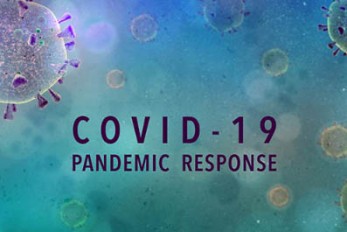
COVID-Update: KAIST on High Alert amid Spring Resurgence
COVID-19 Task Force responds 24-7 and ISSS provides returning international students with a comfort package during 14-day mandatory quarantine In response to the upsurge of COVID-19 cases in the proximate college districts in Daejeon, KAIST announced the enforcement of stricter health and safety regulations. Korean health authorities expected another surge of COVID-19 cases this spring as Korea’s daily new COVID-19 cases have rebounded to the high 600s and over 700 in April, which is the most in over three months. New guidelines issued on April 5 banned faculty, staff, and students from engaging in off-campus activities and utilizing external public facilities. Such facilities include, but are not limited to, bars, cafes, clubs, gyms, karaoke rooms, PC rooms, restaurants, and other crowded indoor spaces. All class and research activities, work meetings, and school events were moved exclusively online, and working from home and flexible working hours were highly encouraged in order to minimize face-to-face interactions on campus. In particular, having meals outside of KAIST cafeterias in groups of two or more was prohibited, while food delivery and take-outs were allowed. Executive Vice President and Provost Seung Seob Lee said in a letter to the KAIST community on April 5 that “the school considers the risk of the current situation to be very high, likely the highest since the outbreak of COVID-19.” Provost Lee then called for more team efforts to contain the current phase of the pandemic and asked everyone to do their part. The school installed new temperature scanners equipped with hand sanitizer dispensers in front of the dormitory entrances to further control the spread of the disease on campus, following confirmed COVID-19 cases among dormitory residents. As the COVID-19 pandemic continues with no clear end in sight, the Task Force for the Prevention of COVID-19 and the International Scholar and Student Services (ISSS) Team at KAIST are working around the clock to reduce the risk of infection spread not only within the campus, but also coming from outside the campus. Under strict health and safety guidelines, KAIST has allowed international students to come back to campus. Currently about 600 international students, mostly graduate students reside on campus. All returning students should complete the mandatory 14-day self-quarantine required by the Korean government at their own expense. The KAIST COVID-19 Task Force is in charge of enacting on-campus health and safety guidelines, responding to reports and inquiries from the KAIST community 24-7, and controlling outsider access, among other responsibilities. The ISSS Team requires returning international students to fill out an entry authorization form and receive approval from the KAIST COVID-19 Task Force prior to returning to campus from their home countries. Once students arrive at their designated quarantine facility, the KAIST ISSS Team sends care packages, which includes some toiletries, instant food, a multipot, a thermometer, and other daily necessities. During the quarantine period, returning students are also advised to follow the directions given by government officials and to coordinate with the ISSS Team. The team also provides useful Korean phrases for international students to help them with communication. The self-quarantine period ends at 12 p.m. 14 days after arrival. Within two days of finishing the 14 days of self-isolation, these students are required to undergo a polymerase chain reaction (PCR) test for COVID-19 at the nearest health center. After confirmed negative, they are allowed to move into on-campus accommodations. KAIST will maintain the current method of remote education and distancing methods until further notice. (END)
-
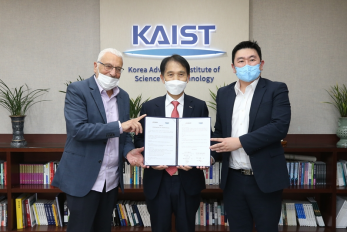
KAIST Teams Up with Yozma Group to Nurture Startups
< Founder and Chairman Yigal Erlich (left), President Kwang Hyung Lee, and Head of Asia Pacific Won-Jae Lee (right) > KAIST has joined hands with Israeli venture capital investor Yozma Group to help campus-based startups grow and build success. The two signed a memorandum of understanding (MOU) on joint technology value creation initiatives at the signing ceremony that was held at KAIST’s main campus in Daejeon on April 8. Under the MOU, Yozma Group will make investments and implement acceleration programs for startups established by KAIST professors, graduates, and students, as well as those invested in by the university. Yozma Group already launched a $70 million fund to help grow companies in Korea and Israel. Yozma Group will use the fund as well as its global acceleration know-how and network of over 400 R&D centers across Israel to help promising KAIST startups enter overseas markets. Moreover, Yozma Group also plans to discover and support KAIST startups that need technology from the Weizmann Institute of Science, Israel’s leading multidisciplinary basic research institution in natural and exact sciences. KAIST is also in talks to locate Yozma Group’s branch office on the university’s campus to ensure seamless collaborations. KAIST President Kwang Hyung Lee explained to Yozma Group’s Founder and Chairman Yigal Erlich and Head of Asia Pacific Won-Jae Lee at the MOU signing ceremony that “startup and technology commercialization are the crucial areas where KAIST will make innovations.” “Cooperation with Yozma Group will help KAIST startups transform their ideas and technologies into real businesses and build a global presence,” he added. Yozma Group started as Yozma Fund, created in conjunction with the Israeli government in 1993 to support the globalization of Israeli startups and to foster the growth of Israel’s venture capital industry. The Fund, which was privatized in 1998, has supported 97 Israeli tech ventures joining the Nasdaq, leading Israel to become a global innovation hub that has the third-most companies listed on the Nasdaq. (END)
-
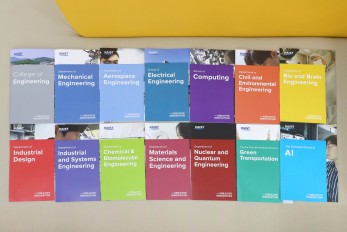
Repeat College of Engineering Publishes Brochure Commemorati..
The KAIST College of Engineering published a brochure commemorating the 50th anniversary of KAIST, along with individual brochures for each of the 13 departments, spotlighting the research areas and innovative research accomplishments of each department. Led by the Dean and Public Relations Committee of the College of Engineering, the brochures introduce the KAIST College of Engineering departments that have achieved the vision of “FOR CREATIVE INNOVATION” based on innovation and challenge. The brochures simultaneously shed light on the the college and each department while establishing a format and content that will remain relevant for years to come, making the brochures quality publications to hold on to as a keepsake. The KAIST 50th Anniversary brochures provided increased accessibility for visitors of various backgrounds (international and domestic university personnel, research institutions, students, etc.) interested in specific departments as well as data regarding the entire college. In particular, the publication is significant in that all 13 departments are brought together in unity as one college of engineering, all the while bringing out the unique characteristics of each department using photography, scenery, and point colors. In addition, various events are being organized throughout the year commemorating the 50th anniversary. Early this year, a special edition of KAIST Breakthroughs, a webzine focusing on the research achievements of the College of Engineering, was published, delving into the research accomplishments of female faculty in the college, and in March of last year, a bulletin board of the previous deans and vice deans of the College of Engineering was installed. Also, social media accounts of the college were newly opened. Through a range of such events and preparation, the college plans to share its accomplishments from the past 50 years, as well as our future vision.
-
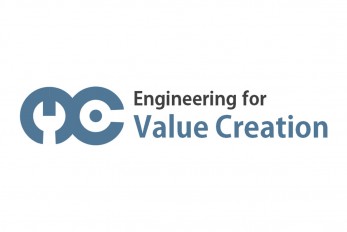
KAIST ME DEPARTMENT HEAD SEARCH
KAIST ME DEPARTMENT HEAD SEARCH KAIST invites nominations and applications for the position of Head, Department of Mechanical Engineering, commending July 1, 2021. KAIST was established by the government in 1971 as the nation’s first graduate school specializing in science and engineering education and research. 2020 QS World University Rankings placed KAIST as the 39th overall and the 22nd in mechanical engineering. KAIST presents more than 11,000 students, including 500 international students and 1,000 faculties and staff. The Department of Mechanical Engineering at KAIST has been playing a pivotal role in high-level education and research in Korea. The graduates, now numbering more than 7,200, have become the leaders in industries, research institutions, universities, and government organizations. Currently, our Department has 88 faculty members, including 36 emeritus professors, 281 undergraduate students, and 564 graduate students. Further details can be found on our department website at http://me.kaist.ac.kr/eng . Our Department is searching for a scholarly leader who has an innovative vision to support our commitment to research, teaching, and services. The new Head shall ensure that the Department of Mechanical Engineering continues to excel at both undergraduate and graduate education and reach global research excellence. The new Head shall also provide the vision in concert with the strategic planning of the Department, which aligns with the goals and plans of the institute. The candidate is expected to be a collegial communicator who possesses strong leadership, strategic and flexible mindsets, and entrepreneurial spirit. In addition, our ideal candidate would be expected to exercise Diversity, Equity, Accessibility, and Inclusion (DEAI) supports and initiatives within the Department. Fluency in the Korean language would be considered beneficial. Applications should be submitted as soon as possible and no later than April 25th, 2021, to ensure full consideration. Application materials should include, as separate documents, a detailed and current curriculum vitae and a preliminary vision for our Department (less than 3 pages). Professor Jeong-Guon Ih Chair, Search Committee for the ME Department Head Email: J.G.Ih@kaist.ac.kr, Phone: 82-42-350-3035,

